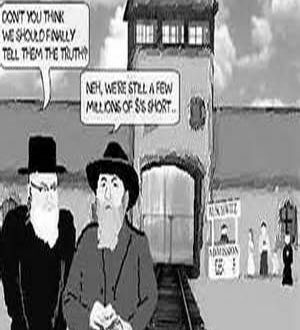No Similar Remembrance of Non-Jews
Non-Jewish victims of genocide, oppression and war do not merit the same consideration as do Jewish victims of the Holocaust. There are no comparable museums, memorials or solemn ceremonies to commemorate, for example, the vastly greater number of victims of Soviet and Chinese Communism.
As historians acknowledge, the non-Jewish victims of Soviet Russian dictator Joseph Stalin greatly outnumber the Jews who perished as a result of Hitler’s policies. Robert Conquest, a prominent scholar of twentieth century Russian history, estimates the number of those who lost their lives as a consequence of Stalin’s policies as “no fewer than 20 million.” /14 Authoritative estimates of the number of Chinese who perished as victims of killings, repression, starvation and forced labor under the Communist regime of Mao Zedong range from about 30 million to more than 60 million. /15
Americans are trained and encouraged to “know” that six million Jews were murdered by the Nazis in World War II. But few Americans, even well-educated ones, have any idea of how many Russians, Poles, Chinese or even Americans lost their lives in that global conflict. Estimates of the number of Chinese who lost their lives as direct and indirect victims of Japanese aggression and occupation during the 1930s and 1940s range from about ten million to more than twice that number. The Chinese government has put the figure at 35 million. /16
During the years 1885 through 1908, an estimated five to eight million Africans perished in the Congo as direct and indirect victims of the brutal policies of the Belgian colonial authorities. These little-remembered deaths were the result of widespread killings, starvation, exhaustion and exposure. /17
‘Holocaust Denial’ Laws
In some countries special “Holocaust denial” laws stifle free and objective discussion of the Holocaust issue. In Israel, Germany, France, Austria and a few other nations, it is a crime publicly to “play down,” dispute, “whitewash,” or “deny” the Holocaust. No other chapter of history is protected by law in this way. Even factually accurate statements that violate “Holocaust denial” laws are punished. Over the years, many individuals in those countries have been fined, imprisoned or forced into exile for disputing Holocaust claims.
‘God’s Chosen’
The Holocaust is often treated with reverence, and as a central event of world history. For many Jews, says Rabbi Michael Goldberg, a Jewish author and religious leader, the “veneration” of the Holocaust has become a new religion. “And as with any organized church,” he adds, “this Holocaust cult has its own tenets of faith, rites, and shrines.” /18
The Holocaust remembrance campaign reflects an arrogant view of Jews as a special and superior people. Abraham Foxman, head of the Anti-Defamation League — one of the most influential Zionist groups — has declared: “…The Holocaust is something different. It is a singular event. It is not simply one example of genocide but a near successful attempt on the life of God’s chosen children and, thus, on God himself. It is an event that is the antithesis of Creation as recorded in the Bible; and like its direct opposite, which is relived weekly with the Sabbath and yearly with the Torah, it must be remembered from generation to generation.” /19
Jewish death and suffering do not deserve to be venerated more than the death and suffering of non-Jews. The Holocaust remembrance campaign deserves scorn, not support, because it is a one-sided effort that serves narrow Jewish and Israeli interests and bolsters Jewish-Zionist power.
Notes
1. A. Barkat, “YadVashem Was the First, And Now It’s The Latest,” Haaretz (Israel), March 15, 2005
( http://www.haaretz.com/hasen/spages/552062.html ).
2. D. Sterritt, “The one serious subject Hollywood doesn’t avoid,” The Christian Science Monitor, Nov. 22, 2002
( http://www.csmonitor.com/2002/1122/p13s01-almo.html ).
3. Peter Novick, The Holocaust in American Life (Boston: 1999), p. 207.
4. Quoted in: David Cesarani, ed., The Final Solution: Origins and Implementation (Routledge, 1994), pp. 305, 306.
5. Tim Cole, Selling the Holocaust (Routledge, 2000), p. 2.
6. P. Novick, The Holocaust in American Life (1999), p. 207. See also pp. 11-12, 208.
7. Melvin Jules Bukiet, “The Museum vs. Memory: The Taming of the Holocaust,” The Washington Post, Sunday, April 18, 1993, p. C3. Quoted in: P. Novick, The Holocaust in American Life (1999), p. 330, n. 104.
8. Norman G. Finkelstein, The Holocaust Industry (Verso, 2003), pp. 37, 52, 149.
9. Paula E. Hyman, “New Debate on the Holocaust,” The New York Times Magazine, Sept. 14, 1980, p. 79.
10. Tony Judt, “Goodbye To All That?,” The Nation (New York), Jan. 3, 2005, p. 17.
11. Tom Segev, The Seventh Million: The Israelis and the Holocaust (New York: 1993), pp. 513, 517.
12. Amira Hass, “Using the Holocaust to ward off criticism,” Haaretz (Israel), March 16 (or 21?), 2005.
13. Leonard Fein, “Too Young to March?,” Forward (New York), May 13, 2005, p. 8; “Israel marks Auschwitz liberation,” BBC News, Jan. 27, 2005 ( http://news.bbc.co.uk/1/hi/world/europe/4212079.stm ) “Sharon: Never Forget Nazi Killers,” CNN News, May 6, 2005( http://edition.cnn.com/2005/WORLD/meast/05/05/holocaust.day/ ).
14. R. Conquest, The Great Terror: A Reassessment (Oxford Univ. Press, 1990), p. 48.
15. S. Courtois, and others, The Black Book of Communism (Harvard Univ. Press, 1999), pp. 4, 463-464; D. Southerland, “Repression’s Higher Toll,” The Washington Post, July 17, 1994, pp. A1, A22, A 23; Richard L. Walker, The Human Cost of Communism in China. A study of the Committee on the Judiciary, US Senate (1971).
16. “Dispute over mission stalls Japanese war museum,” The Palm Beach Post, May 21, 1995, p. 22A (from The New York Times); Sam Jameson, “WWII Apology Fails to Find a Voice in Japan,” Los Angeles Times, June 10, 1995, p. A12.
17. Adam Hochschild, “In the Heart of Darkness,” The New York Review of Books, October 6, 2005, pp.39-42; Adam Hochschild, King Leopold’s Ghost (Houghton Mifflin, 1999); A. Roxburgh, “Belgians Confront Colonial Past,” BBC News, March 9, 2005 ( http://news.bbc.co.uk/1/hi/world/africa/4332605.stm ).
18. Michael Goldberg ,Why Should Jews Survive? : Looking Past the Holocaust Toward a Jewish Future (Oxford Univ. Press, 1996), p. 41.
19. A. Foxman, “Schindler’s List – The Meaning of Spielberg’s Film,” ADL On the Frontline, January 1994, p. 2.
________________________________________
About the Author
Mark Weber is director of the Institute for Historical Review. He studied history at the University of Illinois(Chicago), the University of Munich, Portland State University and Indiana University (M.A., 1977). In March 1988 he testified for five days in Toronto District Court as a recognized expert witness on Germany’s wartime Jewish policy and the Holocaust issue.
 Mouood Mouood English Edition
Mouood Mouood English Edition




